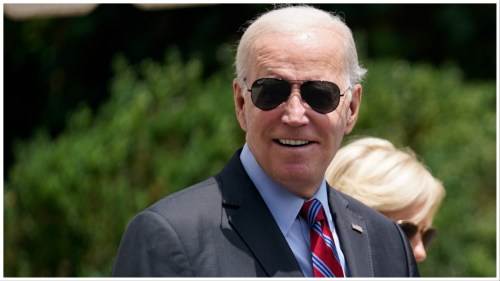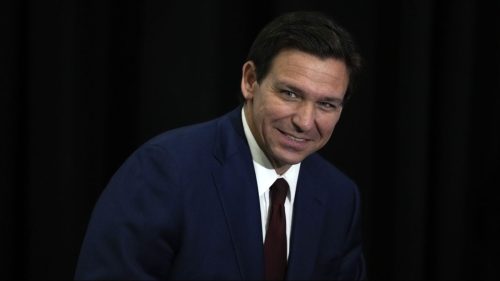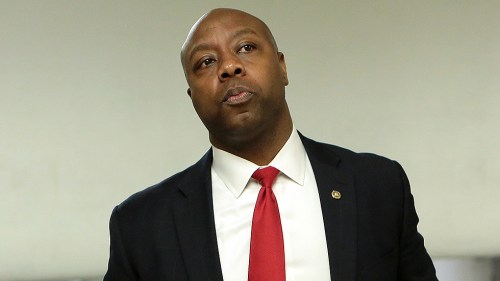Split-ticket voters could be key to helping Democrats keep Senate

Split-ticket voting could help keep Democrats competitive in the battle for control of the Senate, even in swing states where President Biden is suffering low approval ratings.
Democratic Senate candidates have been significantly outperforming Biden in early polls in battlegrounds like Arizona, Montana and Pennsylvania, fueling hopes that their strength could carry the party to victory in the race for the upper chamber even with a weak incumbent at the top of the ticket.
Although split-ticket voting is a relatively uncommon phenomenon, the likelihood of both parties nominating unpopular choices in Biden and former President Trump could make even a small split enough to decide key races.
“It’s essentially a foregone conclusion that you’re going to have two deeply unpopular nominees from the two major parties,” said Democratic strategist Adrian Hemond. “So I wouldn’t be surprised … to see candidates frankly on either side of the aisle potentially outrunning the top of the ticket for their respective side.”
Democrats face an uphill battle to keep their slim majority in the Senate this year. They are defending seats in nearly a half-dozen swing states, with a 51-49 current margin in the chamber. Republicans, meanwhile, are defending two at most, in Texas and Florida, though both clearly lean more toward the GOP.
The party’s path to victory in the Senate is further complicated by the high likelihood that Republicans will pick up at least one seat in West Virginia since incumbent Sen. Joe Manchin (D-W.Va.) decided against running for another term in the solidly red state.
It also needs to maintain incumbents’ seats in Montana and Ohio, two states that voted for Trump in 2016 and 2020 and almost definitely will vote for the Republican front-runner again this year.
But early signs indicate the party might be in a decent position when it comes to the Senate.
Democrats have largely coalesced around their Senate candidates in each of the key states, avoiding messy primary battles and instead allowing them to focus their attention and fundraising on the general election. Republicans, meanwhile, have had to deal with contested primaries in numerous states, including Ohio, Michigan and Nevada.
Polling has shown good news for the Democratic candidates. Biden has been trailing Trump in most swing state polls recently, but Democratic Senate candidates in the same polls have mostly led their likely Republican opponents.
An Emerson College Polling/The Hill survey found Rep. Ruben Gallego, the likely Democratic nominee for Senate in Arizona, leading Kari Lake, the likely GOP nominee, by 7 points. He still led in a three-way hypothetical race that included Sen. Kyrsten Sinema (I-Ariz.), who has not yet announced whether she will seek reelection.
Biden trailed Trump in that poll by 3 points.
Sen. Bob Casey (D-Pa.) has comfortably led his likely Republican opponent Dave McCormick in multiple polls over the past two months, even as Biden is behind Trump in The Hill/Decision Desk HQ’s polling average of the state by 4 points.
Not much polling has been conducted on the Michigan Senate race for retiring Sen. Debbie Stabenow’s (D-Mich.) seat, but the few polls have generally shown the likely Democratic nominee, Rep. Elissa Slotkin (Mich.), narrowly leading the major Republican candidates. Trump has been regularly ahead of Biden in the state by a few points.
“Congresswoman Slotkin has made a sort of political career of outrunning the top of the ticket, outrunning the base numbers in jurisdictions that she’s running in, and I expect her to do the same thing this year,” said Hemond, who is based in Michigan.
Slotkin has run as a moderate Democrat with a military background on her way to three successful House campaigns. She won in 2020 despite Trump carrying her district in the presidential race and Republican John James, now a House member, winning her district in the state’s Senate race.
Hemond said Biden could still win the state and the race will likely tighten as Election Day approaches, but Slotkin is likely to outperform Biden in the state.
“With some rare exceptions, we typically have reasonably close elections here. Certainly the presidential election in 2020, it was quite close,” he said. “And it has the potential to be consequential. The margin for error for both candidates is pretty small.”
Still, Slotkin and other Democrats may have to work against recent historical trends when it comes to split-ticket voting.
The party that won each state in the 2016 presidential race also carried the state’s Senate contest. In 2020, Maine was the only state that voted for one party in the presidential race and elected a Republican senator, Sen. Susan Collins.
Sen. Sherrod Brown (D-Ohio) is running for reelection as the only Democratic statewide officeholder currently in the increasingly red-leaning Buckeye State. An Emerson College poll in January showed him with a slight lead over each of his potential Republican challengers.
Ohio-based Democratic strategist Jeff Rusnak argued that the state has a track record of being open-minded despite its leaning, pointing to the state’s approval of a constitutional amendment protecting abortion rights last November.
He said the fact the amendment was approved with nearly 57 percent of the vote means some voters who backed Trump in 2020 and Sen. JD Vance (R-Ohio) in 2022 swung to support abortion protections in 2023.
“There is a real openness for folks who voted one way in ’20 and/or ’22 that voted in a different way in ’23. And I think that pattern can easily continue, especially with somebody like Sen. Brown,” Rusnak said.
He also noted long-time Rep. Marcy Kaptur’s (D-Ohio) victory in 2022 against Republican J.R. Majewski, who faced allegations of misrepresenting his military service, while Ohio Gov. Mike DeWine (R) easily carried her district in his reelection campaign.
Split-ticket voting appeared more common in some high-profile contests in the 2022 midterms, but Democrats running in a presidential year will have to navigate running along with an unpopular incumbent competing for the same groups of voters.
Arizona-based GOP strategist Constantin Querard said Democrats should seek to distance themselves from Biden to give themselves a better chance in states like the Grand Canyon State, which he added should not be too difficult or come with a significant political cost.
At least one notable, albeit small, data point on this strategy came last month with Rep. Tom Suozzi’s (D-N.Y.) victory in the special election to fill the remainder of former Rep. George Santos’s (R) term. Suozzi won comfortably in a district where polling found Biden to be unpopular by distancing himself from the president.
Suozzi said Biden would not come to the district to campaign with him and was willing to say he disapproves of some of Biden’s policies, arguing he should be more aggressive on immigration. He also leaned on his familiarity, having previously represented the district from 2017 to 2023.
Querard said personal likability could come into play in deciding the results in Arizona.
“I can see people who vote for Trump for just reasons of personal like/dislike don’t vote for Kari Lake. I just don’t know what certain percentage that is. It wouldn’t be a lot. Again, close races out here, it doesn’t have to be a lot,” he said.
Republican strategist Whit Ayres said he is skeptical about many people voting for one party in the presidential race and the other in down-ballot races. He suggested voters may be tempted to skip voting in the presidential election because they are turned off by Trump and Biden and just vote in the others.
He hinted this could benefit Republicans down-ballot as in Georgia in 2020, when thousands didn’t vote in the presidential race but voted for GOP candidates otherwise.
“We may have to redefine split-ticket voting, and say with these historically unpopular candidates, there may be ‘skipped-ticket voting’ where people pass on presidential campaign and vote in other races on the ballot,” Ayres said.
If candidates from both parties try to distance themselves from Trump and Biden, Ayres said it wouldn’t be the first time and can be done successfully. He referenced the 1972 elections, in which Democrat George McGovern lost to President Richard Nixon in a landslide, but Democrats picked up seats in the Senate.
“McGovern got crushed, but a bunch of Democrats won,” he said.
Copyright 2023 Nexstar Media Inc. All rights reserved. This material may not be published, broadcast, rewritten, or redistributed. Regular the hill posts












